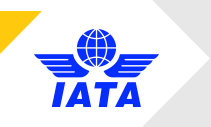International Air Transport Association (IATA) welcomes the opening of the new terminal at Bahrain International Airport. “The opening of the new terminal at Bahrain International Airport is not only an important milestone in the development of Bahrain International Airport as a regional hub but also welcome news for the industry during this difficult time. The new terminal will provide vital capacity and capabilities to cargo operators shipping essential vaccines and PPE equipment immediately, and open the door for increased connectivity once passenger traffic starts to pick up. Aviation is a key pillar of Bahrain’s economy—this has been strengthened today, taking the country one step closer to achieving its Economic Vision 2030 to establish the Kingdom as an aviation center in the region. We congratulate all involved in this significant infrastructure project,” said Muhammad Albakri, IATA Regional Vice President for Africa and the Middle East. The 210,000sq m terminal, which is four times the size of the existing facility, increases the airport’s capacity to 14 million passengers a year, having handled around 9 million in 2019.
Read More »IATA calls for harmonised approach for restart of aviation in ME
IATA has called on governments in the Middle East to harmonise biosafety measures for passengers across the region as aviation restarts. A global framework for restarting aviation while protecting public health has been agreed by the International Civil Aviation Organization (ICAO) and published in the Take-Off guidance. However, inconsistent application of these biosafety measures along with unnecessary border constraints are deterring passengers and suppressing the resumption of air travel in the Middle East. “We are starting to see some governments in the Middle East open their borders to regional and international air travel. This is good news but those flying for the first time since the lifting of restrictions face an array of different types of biosafety measures and procedures – which is causing confusion among passengers and delaying the recovery,” said Muhammad Albakri, IATA’s Regional Vice President for Africa and the Middle East. “An effective COVID-19 test has the potential to be a useful risk mitigation measure. However, tests that neither meet the criteria of speed, scalability and reliability nor are offered at reasonable cost, as we are seeing in some countries in the region, have unintended consequences, causing more problems than they solve and will most likely limit the recovery in air travel demand,” said Albakri. “Imposing quarantine measures on arriving passengers keeps countries in isolation and the travel and tourism sector in lockdown. Fortunately, there are policy alternatives that can reduce the risk of importing COVID-19 infections while still allowing for the resumption of travel and tourism that are vital to jump starting national economies. We are proposing a framework with layers of protection to keep sick people from travelling and to mitigate the risk of transmission …
Read More »Quarantine measures threaten aviation restart in Africa & the Middle East
International Air Transport Association (IATA) urged governments in Africa and the Middle East (AME) to implement alternatives to quarantine on arrival that would allow economies to re-start while avoiding the importation of COVID-19 cases. Government-imposed quarantine measures in 36 countries across Africa and the Middle East (AME) account for 40% of all quarantine measures globally. With over 80% of travellers unwilling to travel when quarantine is required, the impact of these measures is that countries remain in lockdown even if their borders are open. “It is critical that AME governments implement alternatives to quarantine measures. AME has the highest number of countries in the world with government-imposed quarantine measures on arriving passengers. The region is effectively in complete lockdown with the travel and tourism sector shuttered. This is detrimental in a region where 8.6 million people depend on aviation for their livelihoods,” said Muhammad Albakri, Regional Vice President for Africa and the Middle East, IATA.
Read More »IATA calls on KSA government to support aviation in the face of COVID-19 crisis
The International Air Transport Association (IATA) is calling for aviation-specific financial relief measures from the government of the Kingdom of Saudi Arabia to address the severe impact of the COVID-19 crisis on the air transport sector. IATA estimates that revenues generated by airlines in the Saudi market will fall by $7.2 billion in 2020, 35 per cent below 2019 levels. That puts at risk nearly 287,500 Saudi jobs and $17.9 billion of Saudi’s GDP, which is generated by aviation directly and aviation-related tourism. In response to the impact of COVID-19, the Saudi government has introduced broad economic relief measures in excess of $32 billion in financial support for the private sector. It has also provided support for air transport by suspending the airport slot use rules for the summer season and extending licenses and certifications for crew, trainers and examiners. We urge the government to build on this and implement specific financial relief measures for aviation to ensure that the sector will be capable of driving the recovery. “Saudi Arabia has announced financial relief measures for sectors affected by COVID-19, but not specifically for aviation. Given the industry’s role in social and economic development as well as achieving the Kingdom’s Vision 2030, it is important the government prioritises aviation and provide urgent financial relief,” said Muhammad Albakri, IATA’s Regional Vice President for Africa and the Middle East. “Without a viable air transport sector, we can expect a slow and painful economic recovery. Before the crisis, Saudi Arabia was moving at full speed and achieving tangible results in modernisation, infrastructure development and economic growth,” said Albakri.
Read More » Tourism Breaking News
Tourism Breaking News

